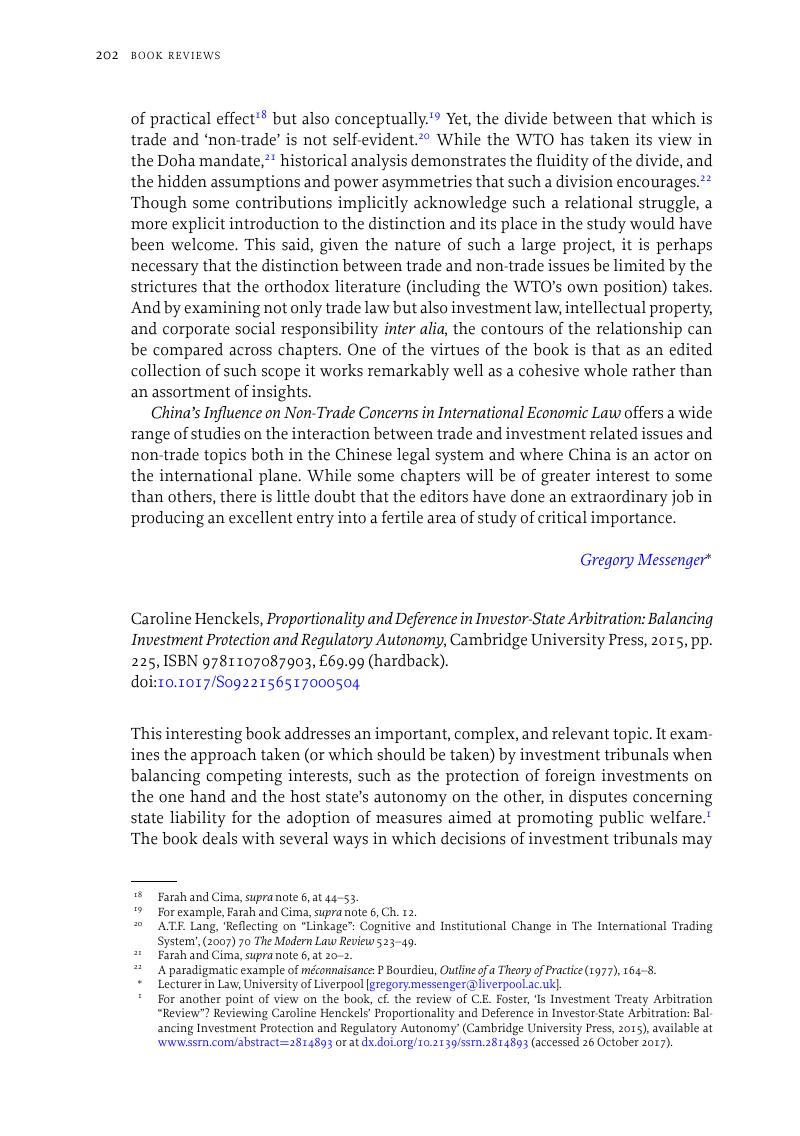No CrossRef data available.
Article contents
Caroline Henckels , Proportionality and Deference in Investor-State Arbitration: Balancing Investment Protection and Regulatory Autonomy, Cambridge University Press, 2015, pp. 225, ISBN 9781107087903, £69.99 (hardback).
Published online by Cambridge University Press: 27 November 2017
Abstract

- Type
- BOOK REVIEWS
- Information
- Copyright
- Copyright © Foundation of the Leiden Journal of International Law 2017
References
1 For another point of view on the book, cf. the review of C.E. Foster, ‘Is Investment Treaty Arbitration “Review”? Reviewing Caroline Henckels’ Proportionality and Deference in Investor-State Arbitration: Balancing Investment Protection and Regulatory Autonomy’ (Cambridge University Press, 2015), available at www.ssrn.com/abstract=2814893 or at dx.doi.org/10.2139/ssrn.2814893 (accessed 26 October 2017).
2 Gruszczynski, L. and Werner, W. (eds.), Deference in International Courts and Tribunals. Standard of Review and Margin of Appreciation (2014)CrossRefGoogle Scholar.
3 On the practice of the ECHR in this regard, cf. Y. Ara, The Margin of Appreciation Doctrine and the Principle of Proportionality in the Jurisprudence of the ECHR (2002); Shany, Y., ‘Toward a General Margin of Appreciation Doctrine in International Law?’, (2006) 16 EJIL 907–40CrossRefGoogle Scholar.
4 On the matter, see M. Oesch, Standards of Review in WTO Dispute Resolution (2004); R. Becroft, The Standard of Review in WTO Dispute Settlement, Critique and Development (2012).
5 Whaling in the Antarctic (Australia v. Japan: New Zealand intervening), Merits, Judgment of 31 March 2014, [2014] ICJ Rep. 226.
6 For a recent critical and analytical collection of cases, see, for example, A. Tanzi and F. Cristiani, International Investment Law and Arbitration. An Introductory Casebook (2013).
7 R. Alexy, A Theory of Constitutional Rights (2002), 388–425.
8 On the different steps and standards of proportionality analysis, see Kingsbury, B. and Schill, S., ‘Public Law Concepts to Balance Investors’ Rights with State Regulatory Actions in the Public Interest – The Concept of Proportionality’, in Schill, S. (ed.), International Investment Law and Comparative Public Law (2010), 75 CrossRefGoogle Scholar; and, more recently Ranjan, P., ‘Using the Public Law Concept of Proportionality to Balance Investment Protection with Regulation in International Investment Law: A Critical Appraisal’, (2014) 3 Cambridge Journal of International and Comparative Law 853 CrossRefGoogle Scholar.
9 See Técnicas Medioambientales (Tecmed) SA v. United Mexican States, ICSID Case No. ARB(AF)/00/2, Final Award, 29 May 2003.
10 GAMI Investments, Inc. v. Mexico, UNCITRAL (NAFTA), Final Award, 15 November 2004.
11 For an analysis of elements of international case law and practice offering interpretative tools which may be applied by investment tribunals with a view to best promoting compatibility and balancing of the relevant rules from different international normative regimes, see Tanzi, A., ‘On Balancing Foreign Investment Interests with Public Interests in Recent Arbitration Case Law in the Public Utilities Sector’, (2012) 11 The Law and Practice of International Courts and Tribunals 47–76 CrossRefGoogle Scholar.
12 As has been suggested by Caroline E. Foster in her review of the book, the most negative effect of a purely ‘review’ based thinking is that it ‘may reduce international law by taking the focus away from these negotiated balances of interest between sovereigns. In focusing instead on the relationship between the private entity that has experienced damage and the State alleged to have caused this, it externalises broader international law. Principles and rules from flanking subfields of international law are more likely to be perceived as irrelevant, rather than being integrated into tribunals’ reasoning’, see Foster, supra note 1.
13 For this distinction, cf. Asteriti, A., ‘Regulatory Expropriation Claims in International Investment Arbitration: A Bridge Too Far?’, in Bjorklund, A.K. (ed.), Yearbook on International Investment Law and Policy (2012–2013), 451 Google Scholar.
14 In the same vein, see, for example, Tanzi, A., ‘Recent Trends in International Investment Arbitration and the Protection of Human Rights in the Public Services Sector’, in Boschiero, N. et al. (eds.), International Courts and the Development of International Law: Essays in Honour of Tullio Treves (2013), 587–98CrossRefGoogle Scholar.
15 Krommendijk, J. and Morijn, J., ‘“Proportional” by What Measure(s)? Balancing Investor Interests and Human Rights by Way of Applying the Proportionality Principle in Investor-State Arbitration’, in Dupuy, P.M., Petersmann, E.U., and Francioni, F. (eds.), Human Rights in International Investment Law and Arbitration (2009), 422–50CrossRefGoogle Scholar.
16 McLachlan, C., ‘Investment Treaties and General International Law’, (2008) 57 (2) The International and Comparative Law Quarterly 361–401 CrossRefGoogle Scholar.




